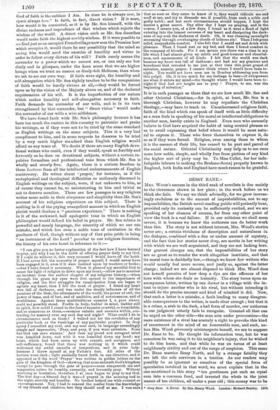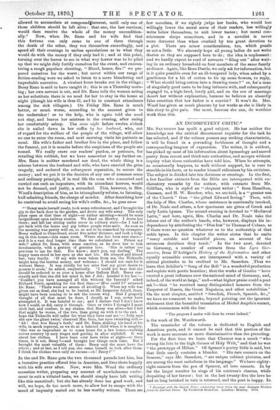BESSY RANE.*
MRS. WOOD'S success in the third rank of novelists is due mainly to the cleverness shown in her plots ; in the work before us we think she fails. We say we think advisedly, for we grow increas- ingly credulous as to the amount of improbabilities, not to say impossibilities, the British novel-reading public will patiently bear, provided only its curiosity can be sufficiently excited, and we are speaking of her chances of success, for from any other point of view the book is a real failure. If in our criticism we shall seem severe, it is because we know the authoress can do better work than this. The story is not without interest, Mrs. Wood's stories never are ; a certain vividness of description and naturalness in the dialogue, combined with a due or undue amount of mystery, and the fact that her stories never drag, are merits in her writing with which we are well acquainted, and they are not lacking here. Our gravest charges are, that the impossibilities of her story are so great as to render the work altogether inartistic, and that its moral tone is decidedly low,—though we know few writers who would usually feel more secure, and justly so, against the latter charge ; indeed we are almost disposed to think Mrs. Wood does not herself perceive of how deep a dye are the offences of her hero with whom she deals so leniently. The story turns upon an anonymous letter, written by one doctor in a village with the in- tent to injure another who is his rival, but without intending it should do the precise amount and kind of mischief it did. Now, that such a letter is a mistake, a fault leading to many disagree- able consequences to the writer, is made clear enough ; but that it is a crime, a stab in the dark, a bad form of murder, our authoress in our judgment utterly fails to recognize. Granted all that can be urged on the other side—the man acts under provocation—the mere existence of a rival has scarcely a right to provoke this kind of resentment in the mind of an honourable man, and such, un- less Mrs. Wood grievously misinterprets herself, we are to suppose Dr. Rane to be. He thought his information true, but he was conscious he was using it to his neighbour's injury, that he wished to do him harm, and that while he was on terms of at least neighbourly civility and out of the range of suspicion. This same Dr. Rane marries Be,ssy North, and by a strange fatality they are left the sole survivors in a tontine. As our readers may possibly be as ignorant as ourselves of the special form of speculation involved in that word, we must explain that in the one mentioned in this story "ten gentlemen put each an equal sum into a common fund, and invested the whole in the joint names of ten children, all under a year old ; this money was to be * Bessy Bane. A Novel. By Mrs. Henry Wood. London: Richard Bentley. 1870.
allowed to accumulate at componndlinterest, until only one of those children should be left alive : that one, the last survivor; would then receive the whole of the money uncondition- ally." Now, when Dr. Ram and his wife find that this fortune can only come to one of them through the death of the other, they vex themselves exceedingly, and spend all their evenings in useless speculations as to what they would do with the money if they only had it ; and at this point, turning over the leaves to see in what way horror was to be piled up that we might duly fortify ourselves for the event, and encoun- tering a rough populace shouting, "Blood, bones, fire 1" we pre- pared ourselves for the worst ; but never within our range of fiction-reading were we asked to listen to a more blundering and improbable narrative. A virulent fever breaks out in the village ; Bessy Rene is said to have caught it ; this is on a Thursday morn- ing; her own servant is out, and Dr. Rene tells the woman acting as her substitute there is no need for her to stay in the house at night (though his wife is thus ill, and he in constant attendance among the sick villagers.) On Friday Mrs. Rane is much better, or much worse, according to the account given to the undertaker or to the help, who is again told she need not stay, and leaves her mistress in the evening, after seeing her comfortably asleep. The same night before twelve o'clock she is nailed down in her coffin by her husband, who, out of regard for the welfare of the people of the village, will allow no one to enter the room, and next morning visits his patients as usual. His wife's father and brother live in the place, and follow the funeral, yet it is months before the suspicions of the people are roused. We really crave our readers' pardon, or patience, for retailing this rubbish, but we have somewhat to say further on. Mrs. Rene is neither murdered nor dead, the whole thing is a seheme between the husband and wife, who have enacted the grim tragedy, and endured the subsequent separation, to secure the money ; and we put it to the decision of any one of common sense and ordinary principle, if in real life the man who concocted and carried out such an imposture, with its attendant horrors, would not be deemed, and justly, a scoundrel. This, however, is Mrs. Wood's description of him, as he triumphantly refutes, to listening, half-admiring friends, the charge of murder. After describing how he contrived to avoid seeing his wife's coffin, &c., he goes on-
" 'Bossy made herself ready, took some refreshment, and I brought the gig to the back door in the garden, and drove my wife away. The only place open at that time of night—or rather morning—would be some insignificant open railway station. We fixed on Howley. I drove her there ; and left her sitting under cover in solitary state—for I had to get back with the horse and gig before people were astir. As soon as the morning was pretty well on, so as not to be remarked by strangers, Bessy walked to Churehend, about five miles' distance, and took a lodg- ing in this house—this same room. Where she has been ever since— and it is a vast deal longer time than we calculated on. Poison my wife !' added Dr. Rene, with some emotion, as he drew her to him involuntarily, with a gesture of genuine love. She is rather too precious to me for that. You know ; don't you, my darling.' The happy tears stood in her eyes as she met his. He stooped and kissed her, very fondly. 'If my wife were taken from me, the Ticknells might keep the tontine money, and welcome ; I should not care for it without Bessy. It was chiefly for her sake that my great desire to possess it arose,' he added, emphatically. I could not bear that she should be reduced to so poor a home after Dallory Hall. Bossy con- stantly said that she did not mind it, but I did ; minded it for her.'— 'Couldn't you have managed all this without the funeral ?' asked Richard North, speaking for the first time.—' How could I?' returned Dr. Rana. There were no means of avoiding it. When my wife was given out as dead, she had to be buried, or Mr. Inspector Jekyll, there, might have been coming in to ask the reason why. Had I properly thought of all that must be done, I should, as I say, never have attempted it. It was hateful to me ; and I declare that I don't know how I could, or did, carry it through. Once or twice I thought I must stick fast, and confess, to my shame, that Bessy was alive—but I felt that might be worse, of the two, than going on with it to the end. I hope the Ticknells will suffer for what they have cost me.'—' Jelly says she saw the ghost twice,' observed Mrs. Gass, her eyes twinkling still.— ' Ah ! that was Bessy's fault,' said Dr. Rene, shaking his head at his wife, in mock reprove], as we do at a beloved child when it is naughty.
She was so imprudent as to come home for a few hours—walking across country by easy stages and getting in after nightfall. It was about her clothes. I have been over here twice at night—or three times, is it not, Bessy ?—and brought her things each time. But I brought the most valuable of them : Bessy said she must have the others ; and at last, as I tell you, she came herself, to look after them. I think the clothes were only an excuse—eh! Bessy ?' " In the end Dr. Rime gets the two thousand pounds lent him, has a lucrative practice offered him in America, and lives there happily with his wife ever after. Now, were Mrs. Wood the ordinary sensation writer, preparing any amount of unwholesome excite- ment to suit a vitiated taste, we should simply have left writing like this unnoticed ; but she has already done too good work, and will, we hope, do too much more, to allow her to escape with the meed of impunity meted out to leas worthy writers. There are few novelists, if we rightly judge her books, who would lose willingly lower the moral sense of their readers, less willingly write below themselves, to suit lower tastes ; but moral con- sciousness sleeps sometimes, and in a novelist is never more dormant than when overlaid by too great devotion to a plot. There are minor considerations, too, which puzzle us not a little. We sincerely hope all young ladies do not write diaries as they are supposed here to do ; the idea is unpleasant : and we hardly expect to read of servants "filing out" after wait- ing in an ordinary household on four members of the same family at dinner. Again, like Rosa Dartle, we only ask for information, but is it quite possible even for an ill-tempered lady, when asked by a gentleman for a bit of cotton to tie up some flowers, to reply, "What should bring cotton into a thawing-room?" or, for'a man of singularly good caste to be long intimate with, and subsequently engaged to, a high-bred, lovely girl, and on the eve of marriage desert her without explanation, because he believes an absurdly false assertion that her father is a convict? It won't do. Mrs. Wood has given as much pleasure by her works as she is likely in this story to give pain. She must, because she can, do worthier work than this.































 Previous page
Previous page